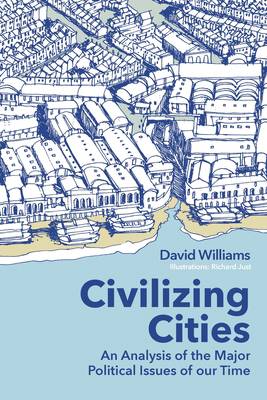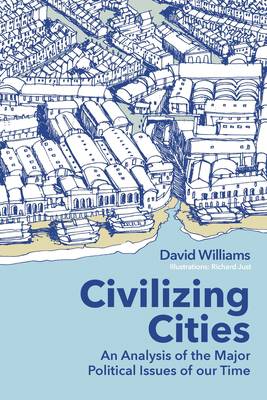
- Retrait gratuit dans votre magasin Club
- 7.000.000 titres dans notre catalogue
- Payer en toute sécurité
- Toujours un magasin près de chez vous
- Retrait gratuit dans votre magasin Club
- 7.000.0000 titres dans notre catalogue
- Payer en toute sécurité
- Toujours un magasin près de chez vous
Civilizing Cities
an analysis of the major political issues of our time
David WilliamsDescription
Cities affect all our lives. Fernand Braudel identified their three functions, providing security, shelter and markets. Ideologists like Ebenezer Howard (garden cities) and Le Corbusier (monumental redevelopment) suggested how cities should work. Jane Jacobs showed how they actually work. Civilizing Cities expands considerably from these foundations in three parts: past, present and future.
To improve cities, we need to replace 'normative' and 'market-led' planning ideologies based on the bulldozer, with pragmatic planning based on small-scale incrementalism and 'intensification'. We also need practical sustainable policies, which the National Planning Policy Framework signally fails to provide.
For this, we need politicians with the intellectual rigour, social understanding and felt need for fairness, like Clement Attlee, Lloyd George and, in Birmingham, Joseph Chamberlain. He or she will need to reset the balance between central and local government, make taxes more consistent (a bedroom tax just on the poor?) and reform the House of Lords as a Citizens Assembly.
Finally, the book briefly surveys the impact of the Covid-19 pandemic and the need to devolve more powers to local councils, covering education, health, transport and welfare etc. Planning must also return to its roots in public health, and create healthier cities with less pollution, inequality, unemployment and isolation.
Spécifications
Parties prenantes
- Auteur(s) :
- Editeur:
Contenu
- Nombre de pages :
- 404
- Langue:
- Anglais
Caractéristiques
- EAN:
- 9781911593799
- Date de parution :
- 16-02-21
- Format:
- Livre broché
- Format numérique:
- Trade paperback (VS)
- Dimensions :
- 156 mm x 234 mm
- Poids :
- 562 g

Les avis
Nous publions uniquement les avis qui respectent les conditions requises. Consultez nos conditions pour les avis.






